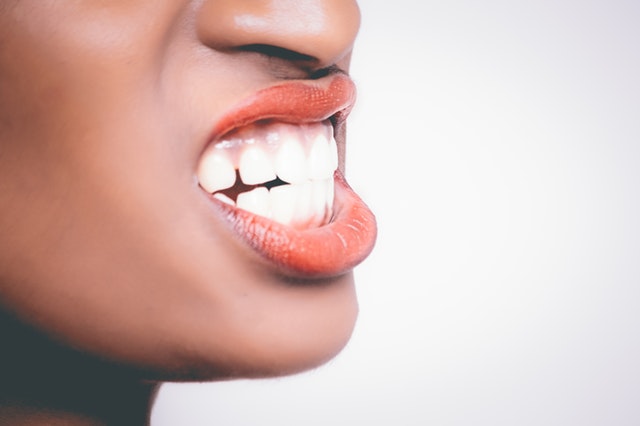Imagine it’s your birthday and family have come over with an ice cream cake with your favorite filling! Candles have been lit, you make a wish, blow out the candles, and are served the first slice. As soon as you bite into the cake, however, you get multiple zingers from the ice cream radiating into and up your teeth, causing shockwaves for the rest of the mouth. You put the cake down, rubbing your tongue against the effected teeth until they calm down. And this is not the first time your teeth have hurt eating or drinking something cold or sweet. Just a couple of days ago it was ice water with lemon. You’ve always been able to eat anything and everything! Why are your teeth bothering you now?
Viewed under a microscope, healthy teeth (and bone) resemble honeycombs. Scientists think teeth were created this way in order for our ancient ancestors to be able to tell the difference between safe and unsafe foods. Now in the modern era of toothpastes and mouthwashes developed to help protect our teeth, tooth sensitivity, unfortunately, has been on the rise, and starting earlier. What can be done to help prevent this from happening in the first place, and to help prevent this from happening in the future?
- Brushing too hard: Over time, brushing too hard or using a hard-bristled toothbrush can wear down enamel and cause the second layer of tooth — dentin — to become exposed. It can also cause recession of the gums (the gum tissue pulls away from the teeth). The American Dental Association has actually trademarked “Two Minutes Two Times a Day” to make sure we are brushing, not scrubbing, our teeth. The average American brushes for about 42 seconds at one time. Our toothbrushes are not SOS pads. A great way to prevent scrubbing teeth is by getting an electric toothbrush that has a pressure sensitivity mode built in. If pressing too hard, the motor will continue to run, but the bristles will stop until you pull away from the teeth a bit. Philips Sonicare is one of such brushes. Plus, if you like the feel of a harder brush, all electric toothbrushes do feel a bit harder, even though they have soft bristles.
- Gum recession: Using a hard/medium toothbrush over time, and/or gum disease (inflamed gums due to oral bacteria) gums will move away from teeth. Gums like a clean environment to do their job, which is hold the teeth in place, connecting to the jaw bone. If the area between the gums and the teeth are filled with plaque (bacteria, bacterial poop, and excess foods stuffs that do not dissolve in saliva), the gums pull away, causing the root surface to become exposed.
- Cracked teeth: chomping on ice over time, as well as, chewing whole low density fat nuts like brazil, almonds, walnuts, can cause superficial fractures on the enamel surface of teeth. These are known as “craze lines”, which can widen and deepen, creating passage ways for cold/hot/sweets to go directly to the nerve. If these habits continue, teeth can chip and break. Eating these nuts are incredibly nutritious, however, so simply eat them diced/chopped/minced/slivered/broken down. The larger the nut, the easier the tooth – and its restoration – can break.
- Grinding or clenching your teeth may wear down the enamel and expose underlying dentin. Wearing a night guard can help protect teeth from this habit, usually caused by stress.
- Home-made tooth whitening products or toothpaste with baking soda found in the cooking isle and/or commercial whitening toothpastes that have silicon dioxide – sand – as their chief whitening ingredient abrade the enamel, causing it to wear and thin down. Charcoal can also be a cause of tooth sensitivity for those that use it daily as their normal toothpaste. Preliminary studies show that charcoal-based toothpastes should only be used as often as one does a facial mask. Put in the same category, charcoal toothpastes can safely be used once a month, or every other week at the most.
- Chronic alcohol-based mouthwash or breath freshener use: Long-term use of alcohol-based mouthwashes can dry the mouth out, creating teeth hypersensitivity to the elements. Some over-the-counter breath fresheners contain acids that can worsen tooth sensitivity if you have exposed dentin (the middle layer of the tooth). The acids further damage the dentin layer of the tooth. The more dentin exposure, the yellower the teeth become as well.
- Acidic foods: Regular consumption of foods and beverages with a high acid content, such as citrus fruits, tomatoes, pickles, tea, carbonated beverages can cause enamel erosion. Some nutritionists/dieticians/health care coaches recommend warm water with lemon first thing in the morning to help flush the digestive system and rehydrate the body. Dentists strongly encourage then chasing that water with a regular glass of water to bring the mouth back to a neutral pH. Oral bacteria thrive in an acidic environment, causing an increase in tooth decay and gingivitis. Drinks that are carbonated have carbonic acid in them, causing both an acidic oral environment as well as acid rain for the teeth. Dentists recommend drinking such beverages only with a meal when there is an increase of saliva to help deal with and neutralize them.
- Recent routine dental procedures: Sensitivity can occur following teeth cleaning, deep cleanings, crown placement, and tooth restoration. Sensitivity caused by dental procedures is temporary and usually disappears in 4 to 6 weeks.
So, what can be done to help? Fluoride is an ion that acts as an insulator, absorbed into and bonds with the tooth, protecting the tooth from hot/cold/sweets. If OTC fluoride products do not help, dentists have other modes of delivery, such as varnish, gel, or solution, to coat and protect teeth. OTC desensitizing toothpastes are all regulated by the FDA, so they will all have the same ingredient to help protect and calm the teeth over time. This active ingredient is a salt, usually potassium nitrate, used to help make the toothpaste more alkaline or basic. For those that choose to be fluoride-free, oil of cloves has been used for centuries to help calm the nerves of teeth. Dip a clean tissue, cotton swab, or cotton ball into the oil and wipe it over the gums at the point of pain. People can also use whole cloves. They are placed on the affected area for several minutes at a time.
Fortunately, we have several ways of preventing and reducing tooth sensitivity! The first step is finding the source, then eliminating that from our diets/oral hygiene routines. If trying things at home does not work, your dentist should be able to find an alternative to protect your teeth. Happy eating!
http://clevelandclinic.org
https://www.medicalnewstoday.com/articles/324731.php
Content provided by Women Belong member Joy Poskozim

















































 Women Belong Book Club: Living on Purpose
Women Belong Book Club: Living on Purpose Charlotte NC Special Event: Game Show Battle Rooms!
Charlotte NC Special Event: Game Show Battle Rooms! Nourish Coaching Circle
Nourish Coaching Circle SFG: Adaptable on Purpose: Staying Steady in Change to Live Out Your Mission
SFG: Adaptable on Purpose: Staying Steady in Change to Live Out Your Mission Book Club: Unreasonable Hospitality - ZOOM
Book Club: Unreasonable Hospitality - ZOOM